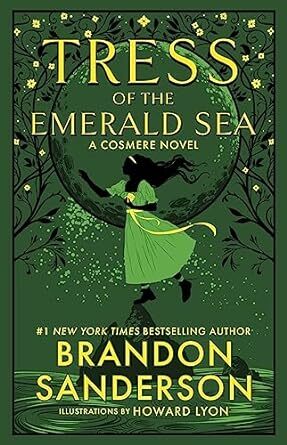Brandon Sanderson is wildly popular, but honestly? I don’t get it. While I appreciate what he does, for whatever reason, his novels have never really resonated with me, with maybe one exception. Ten years ago (I remember it vividly—pun not intended) I read Warbreaker and enjoyed it quite a bit. Then I immediately went on to read something from one of his other series and that’s when I saw a problem.
The magic systems are role playing game mechanics.
Thankfully, Sanderson doesn’t write Lit-RPG, where the stories themselves are board game campaigns. The characters are cleverly crafted and the plots in which they find themselves have stakes, twists and turns. But when he gets into how the magic works I feel like I need to remember all this so I know what to do when it’s my turn to role the dice. Personally, I prefer what Jim Butcher does in The Dresden Files, where the magic is all about focus and intent, with objects as focal points and delivery systems. For whatever reason, it feels more organic.
Points to Sanderson for what he does, and does very well, though.
However, a friend recently told me that she really enjoys Brandon Sanderson’s Tress of the Emerald Sea as a novel akin to The Princess Bride and other light fantasy/romance/adventure stories. Color me intrigued. I had an Audible credit to burn, so I figured why not and gave it a listen. As a writer who tends to burn through plots at breakneck speed and thus ends up with short stories, I really appreciated how much time Sanderson devotes to the Ordinary World and building the relationships between his characters.
Tress and Charlie may not be Buttercup and Wesley, but we’re still rooting for them.
Their story is almost a sort of inverted Princess Bride, where the ordinary girl must go on a quest to rescue her royal love interest. And she starts out delightfully ordinary. However, when Charlie needs help Tress doesn’t hesitate (once she has her parents’ blessing, which is a nice touch). Up to this point, the story is moving along at a pleasant clip and the magic system has yet to take center stage.
Until…
…Tress ends up on a pirate ship. And this is where the story threw me. When I think of The Princess Bride or Neil Gaiman’s Stardust (not linking, because you don’t need to read it), our heroes travel to many different places and meet a variety of people. The majority of Sanderson’s novel takes place on board the ship with a relatively small, if colorful, group of characters. The storytelling mechanics are brilliant, but it stops being the story I expected and wanted it to be. While the ship continues to sail around the different seas, in a way the currents that move a narrative seem suddenly becalmed.
So now there’s time for the rules. Get out your dice.
Actually, the magic system mechanics aren't that bad this time. Yes, they're complex and color-coded. But it doesn’t seem as gamey here, and that’s a good thing. Most interesting are the riddles surrounding curses, which lead to some nice twists. Sanderson! More of this, please. My only big complaint is the description of the sorceresses’s lair at the climax, which is far too meta and clever. A good rule of thumb is, if you think you’ve written something clever you should cut it out. Were it possible to throw an audiobook against the wall, I would have done so.
Still, I get it.
Tress of the Emerald Sea is a nice, little story. Perhaps on review I’ll enjoy it more for what it is and not what I initially wanted it to be. The twists will make re-reads rewarding if you remember them, which is always admirable. Am I going to pick up another Sanderson novel on my own? No, probably not. But someday I might be open to recommendations.

























